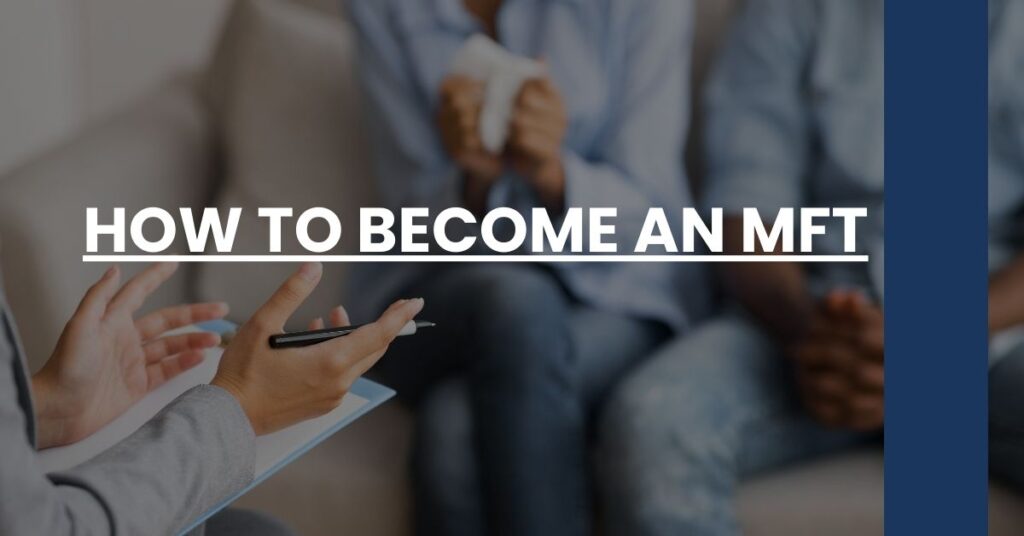How to Become an MFT: Your pathway to a fulfilling career starts here.
- Education for MFTs: Secure the essential academic foundation in marriage and family therapy.
- Licensure Process: Navigate the steps to licensure with clarity and confidence.
- Career Growth: Discover advancement opportunities within the marriage and family therapy field.
Begin your journey on how to become an MFT today.
- Understanding the Role of a Marriage and Family Therapist
- Educational Requirements for MFTs
- Required Training and Clinical Experience
- The Licensure Process for MFTs
- Specializations and Certifications in Marriage and Family Therapy
- State-Specific Requirements for MFTs
- Continuing Education and Professional Development
- Building a Career as an MFT
- Challenges and Rewards of Becoming an MFT
- Conclusion: Embarking on Your Journey to Becoming an MFT
Understanding the Role of a Marriage and Family Therapist
Who is a Marriage and Family Therapist (MFT)?
A Marriage and Family Therapist (MFT) is a licensed mental health professional specializing in treating individuals, couples, and families through therapeutic models that focus on relationships. Have you ever pondered why families function the way they do or what makes a couple’s relationship endure through challenges? These are the kinds of complex questions MFTs analyze and address.
Areas of Focus:
- Relationship dynamics: Understanding how individuals interact within a relationship or family setting and the patterns that emerge.
- Communication strategies: Equipping clients with the tools to communicate effectively to resolve conflicts.
- Behavioral change: Assisting clients in bringing about positive behavior changes within the context of their relationships.
- Emotional support: Providing a supportive environment for clients to express and process emotions.
MFTs are vital in supporting individuals and families through life transitions, mental health concerns, and the everyday stresses that impact family dynamics. They work across diverse settings, from private practices to hospitals and schools.
The Impact of an MFT:
If you’re seeking to make a real difference in people’s lives by promoting mental wellness within the context of close relationships, then learning how to become an MFT could be your calling. The work of an MFT is more than just a career; it’s a commitment to nurturing the wellbeing of relationships that form the fabric of society.
Educational Requirements for MFTs
Becoming an MFT requires not just a passion for helping families but also formal education and specialized training. Here’s what your educational journey might look like:
Degree Requirements:
- Undergraduate Degree: A bachelor’s degree, often in psychology, social work, or a related field.
- Graduate Degree: Most states require a master’s or doctoral degree in marriage and family therapy, or a related mental health field with a specified number of coursework hours dedicated to marriage and family therapy.
Key Coursework:
Courses typically cover a range of topics, from the theoretical underpinnings of family systems therapy to the practical application of therapeutic techniques.
- Human Development: Insight into the various stages of life and how these impact family dynamics.
- Ethics in Therapy: Understanding the ethical considerations of practicing therapy.
- Cultural Competence: Preparing to serve diverse populations with cultural humility and awareness.
Required Training and Clinical Experience
The path toward MFT licensure is paved with extensive practical training aimed at ensuring you’re prepared for the challenges of therapy sessions.
Clinical Training:
Hands-on experience is key, and you will be expected to complete a significant number of supervised clinical hours.
- Graduate Practicum: You’ll start seeing clients under supervision during your graduate studies. This serves as an introduction to real-world counseling.
- Post-graduate Supervised Experience: After your degree, you need to amass direct clinical experience, often 3,000 hours or more, depending on your state’s requirements.
These experiences are essential for developing your skills in a supported environment.
The Licensure Process for MFTs
Gaining licensure is crucial for your credibility and legal practice. Every state has its own set of requirements, but you can expect to encounter the following steps:
Examining Competence:
- National Exam: A comprehensive examination assessing your understanding and application of marriage and family therapy principles.
- State Law and Ethics Exam: Specific to your state, this exam evaluates your knowledge of local laws and ethical standards in practice.
Application and Background Checks:
It’s essential to be ready for the administration side of the process, which includes:
- Complete Paperwork: Submitting university transcripts, proof of supervised hours, and other documentation.
- Background Check: Ensuring you are fit to practice with a clean legal record.
Once licensed, you’ll join a community of professionals dedicated to enhancing the field’s standards and enriching the lives of families.
Specializations and Certifications in Marriage and Family Therapy
The field of marriage and family therapy is broad and rich with opportunities to specialize or certify further, enabling you to cater to specific populations or deepen your knowledge.
Areas of Specialization:
These may include but aren’t limited to:
- Addiction counseling
- Trauma and crisis intervention
- Child and adolescent therapy
- Couples therapy
By honing your skills in a specialized area, you differentiate your practice and provide more targeted support to your clients.
Continuing Education:
Even after licensure, the learning never stops. Continuing education is a requirement and a privilege. It ensures you are at the forefront of therapeutic techniques and emerging research. Consider engaging with reputable institutions, such as the American Association for Marriage and Family Therapy, for advanced certifications and learning opportunities.
Specializing and certifying is more than expanding your toolkit; it’s about deepening the quality of care you can provide and affirming your commitment to your clients’ diverse needs.
State-Specific Requirements for MFTs
If you’re plotting a course on how to become an MFT, it’s crucial to factor in that the path can look quite different depending on where you plan to practice. Each state in the U.S. has its own set of rules and regulations that govern licensure for marriage and family therapists.
Navigating Regional Variations:
Understanding and adhering to state-specific licensure requirements is not just a legal obligation but also a demonstration of your commitment to ethical practice. For instance, while some states may require a minimum number of face-to-face client contact hours, others may specify particular types of clinical experience.
Here’s how to stay apprised of the regional differences:
- State Licensing Board Website: This is your most direct source of current and accurate information. Consult the Association of Marital & Family Therapy Regulatory Boards (AMFTRB) for links to each state’s regulatory board.
- Local MFT Associations: Often, state-specific MFT associations offer valuable resources and guidance for those in the licensure process.
Meeting Academic and Clinical Prerequisites:
Each state typically requires:
- A Graduate Degree: While this is a common requirement, some states may accept varying disciplines as long as certain MFT-related coursework is completed.
- Supervised Clinical Hours: The number and nature of these hours can vary significantly across states.
For an example of the intricacies of state requirements, take a look at New York’s unique process, with its specific educational and experiential stipulations for MFTs.
Navigating state-specific requirements is a stepping stone in your journey to become an MFT that ensures your competency aligns with the unique needs of the community you will serve.
Continuing Education and Professional Development
As an MFT, learning is a perpetual endeavor. The therapy landscape continuously evolves, and to provide the best care, you need to evolve with it. Continuing education (CE) is not only a requirement for maintaining your license but also a mechanism for professional growth and enhanced service delivery.
Committing to Lifelong Learning:
Continuing education fosters a culture of lifelong learning and allows you to:
- Stay Current: Keep up-to-date with the latest research, therapeutic methods, and changes in legal and ethical standards.
- Expand Skills: Develop new competencies that can diversify your practice and enhance your career trajectory.
As you continue on your pathway to becoming an MFT, remember that CE is an investment in your professional future, ensuring that the support you offer your clients is informed by cutting-edge insights.
Building a Career as an MFT
Embarking on a career as an MFT can be as rewarding as it is challenging. The journey ahead is not just about obtaining licensure; it’s about building a meaningful practice that impacts lives.
From Licensure to Practice:
- Private Practice: Many MFTs dream of opening their own practice. Start by gaining experience, understanding business principles, and establishing a network.
- Employment Opportunities: Consider positions in mental health clinics, schools, or government agencies as a way to gain diverse experience and impact various populations.
Career Advancement:
- Supervision Roles: With experience, some therapists transition into supervisory roles, guiding the next generation of MFTs.
- Specialization: Further specialize in areas like trauma or sex therapy to serve niche markets.
Each step you take to become an MFT adds a depth of understanding and capability to your professional toolkit, enabling you to craft not just a job, but a vocation.
Challenges and Rewards of Becoming an MFT
The road to become an MFT is often winding, featuring both unanticipated challenges and profound rewards.
Confronting Challenges:
- Intensive Training: The rigorous education and clinical training can be demanding but ultimately shapes your expertise.
- Emotional Rigor: The emotional weight of carrying others’ stories necessitates robust self-care and professional support.
Embracing Rewards:
- Personal Fulfillment: Each breakthrough with a client confirms the immense privilege and positive impact of your work.
- Professional Recognition: As you gain experience and possibly contribute to the field’s body of knowledge, your professional standing and opportunities will expand.
The endurance required on this journey is matched by the growth it fosters, both for you and those you will help as an MFT.
Conclusion: Embarking on Your Journey to Becoming an MFT
As you set forth on how to become an MFT, let this guide serve as a blueprint for the road ahead. The steps you take, from solidifying your educational foundations to ongoing learning and specialization, will craft a career rich with complexity and fulfillment.
Becoming an MFT means embracing a future where you can make a significant difference in the lives of individuals, couples, and families. It is about accepting a challenge that is not only career-defining but also life-enriching.
Your mission to heal relationships and foster wellbeing in your community is a noble pursuit. So seize your passion, prepare for the dedication required, and set your course on how to become an MFT. The journey is undoubtedly substantial, but so too are the rewards waiting on the other side.
Learn how to become an MFT: essential steps, education, licensure, and career growth for Marriage and Family Therapists.

